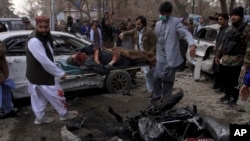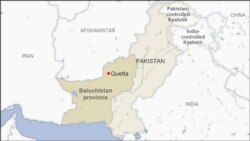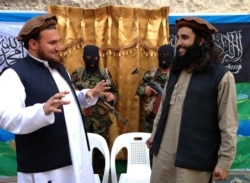A suicide blast Monday ripped through a crowd in southwestern Pakistan, killing at least eight people and injuring around 20 others.
There were no immediate claims for the deadly attack in Quetta, the capital of Baluchistan province.
Police chief Abdul Razaq Cheema told reporters the bomber detonated explosives strapped to his body when security guards intercepted and tried to stop him from entering a rally of Islamic activists.
At least three security personnel were among those killed, Cheema added.
The impoverished but natural resource-rich largest Pakistani province has for years experienced a low-level Baloch separatist insurgency, while militants linked to proscribed terrorist groups, including Islamic State, also are active there.
Militant escape
Monday’s bombing came on a day when Pakistani Interior Minister Ijaz Shah confirmed widespread media reports that a notorious militant leader had recently escaped from the custody of state security agencies.
The confirmation comes days after Ehsanullah Ehsan, the former spokesman of the Pakistani Taliban militant group, formally known as Tehreek-e-Taliban Pakistan (TTP), released a video message circulated on social media claiming he had fled the custody of security agencies.
“The news is true. It's true,” Shah told reporters in Islamabad about Ehsan's escape.
Government and military officials had until now neither denied nor confirmed Ehsan's mysterious disappearance. In his message, Ehsan claimed he had voluntarily surrendered to Pakistani security officials three years ago under an agreement.
He said he had honored his part of the agreement, but accused Pakistani authorities of violating their terms by keeping him in detention along with his family. He said those circumstances forced him to plan his escape.
The Pakistani military at the time had confirmed Ehsan remained in their custody.
Ehsan was a TTP spokesman until he joined the group’s breakaway faction known as Jamaat-ul-Ahrar, which was also outlawed by Pakistani authorities.
The TTP, designated as a global terrorist by the United States, has claimed many high-profile militant attacks in Pakistan, including the one on Nobel laureate Malala Yousafzai.
While in custody, Ehsan spoke to a Pakistani television station and claimed the TTP were receiving extensive support and funding from intelligence agencies of neighboring India and Afghanistan to carry out terrorist attacks in Pakistan.







